CORNOGRAPHY
It’s been 70 years since Rodgers and Hammerstein ushered in the “golden era” of Broadway musicals with Oklahoma! but given the right production, the innovative musical can still soar. Old-fashioned staging, however, can thicken the aging brown dust on the bright green corn; that’s when the innovative musical can show its age. Well, an Oklahoma! twister blew through Lyric Opera last night, yet was incapable of blowing the loess off of one of the most groundbreaking musicals in theater history.
The musical comedy was reinvented for the ages when Oklahoma! was created in 1943; instead of merely inserting tunes and dances into the story, character-specific song and dance were used to tell a story. The musical avoids creaking with age because Hammerstein’s extremely funny libretto shuns overt sentimentality, and his lyrics are chock-full of poetic imagery and clever internal rhymes. The memorable Copland-esque score contains inimitable Rodgers waltzes such as “Out of my Dreams” and “Oh, What a Beautiful Mornin’.” There is a reason that it’s so consistently produced: it’s darn near foolproof.
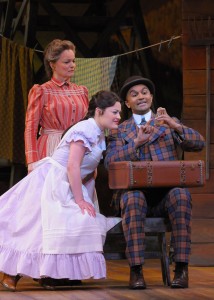 While R&H may have broken the mold of the “boy-meets-girl” musical comedies which came before, their tale of young romance on the prairie still retains hackneyed elements, holdovers from the same musicals they were breaking away from — a corniness which lessened in Carousel (1945) and South Pacific (1949). Director Gary Griffin plays up the corn and milks this cash cow for all its worth; in doing so, he falls into the trap of so many Oklahoma! revivals by eschewing subtext for a heavy-sighin’, fly swattin’, chicken scratchin’, turkey trottin’ ensemble made up of eye-popping muggers with arms akimbo or thumbs tucked into belt loops.
While R&H may have broken the mold of the “boy-meets-girl” musical comedies which came before, their tale of young romance on the prairie still retains hackneyed elements, holdovers from the same musicals they were breaking away from — a corniness which lessened in Carousel (1945) and South Pacific (1949). Director Gary Griffin plays up the corn and milks this cash cow for all its worth; in doing so, he falls into the trap of so many Oklahoma! revivals by eschewing subtext for a heavy-sighin’, fly swattin’, chicken scratchin’, turkey trottin’ ensemble made up of eye-popping muggers with arms akimbo or thumbs tucked into belt loops.
Sure, Hammerstein’s dialogue still receives much-deserved laughter, but the line-readings in this rendition are some of the flattest I have ever heard, lacking in originality, humor, authenticity, and above all, any underlying meaning and motivation. Is this the same Mr. Griffin who transformed Sondheim’s Sunday in the Park with George at Chicago Shakes last year by infusing the show with humanity and intimacy?
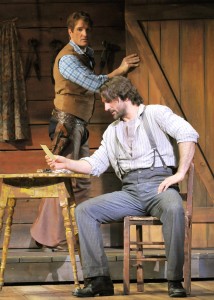 And while the themes of expansion and American gumption seem apropos for the behemoth Civic Opera House, it’s so big that actors have difficulty “feeling” their audience and therefore have trouble holding for laugh lines. Overall, the amplification worked well and the vocals were the highlight of the evening, led by Conductor James Lowe and his huge 37-member orchestra (Robert Russell Bennett’s original orchestrations still sound thrillingly inventive).
And while the themes of expansion and American gumption seem apropos for the behemoth Civic Opera House, it’s so big that actors have difficulty “feeling” their audience and therefore have trouble holding for laugh lines. Overall, the amplification worked well and the vocals were the highlight of the evening, led by Conductor James Lowe and his huge 37-member orchestra (Robert Russell Bennett’s original orchestrations still sound thrillingly inventive).
Another idea which must have seemed great on paper but flat-lined in this production was the recreation of Agnes DeMille’s original choreography (supervised by longtime colleague Gemze de Lappe — who danced the “Dream Laurey” in the national company in 1943). Anyone who has seen the film is already familiar with DeMille’s ingenious use of storytelling in dance, but it lacks tension and excitement here, and oddly enough doesn’t seem to fit this stage. This is one of the many reasons why this outing feels less like an exciting rejuvenation than a museum piece.
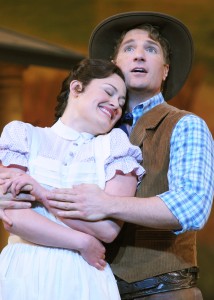 Also, the casting of Broadway performers Ashley Brown (Mary Poppins) as Laurey and John Cudia (“the only actor to have performed as both the Phantom and Jean Valjean on Broadway”) as Curly is curious; while it may have been unnoticeable to those in the balcony, viewers closer to the performers will see that they are a bit long-in-the-tooth to play late teens / early twenties (although Cudia sounds great and certainly looks like Curly–had the cowboy been in his forties, that is). Plus, the pair simply lacks chemistry. All would have been forgiven if they didn’t come off with quite such an earnest superficiality (likewise Chicago favorite Paula Scrofano as Aunt Eller). The sparkling clarity of Brown’s soprano is most impressive, but I suspect her casting was part of a package to sway ticket buyers (Brown starred in Showboat at the Lyric last year). Naturally, Bari-hunk David Adam Moore sounded great as the threatening hired hand, Jud, but he seemed as menacing as a guy at the gym who wants to cut in line at the machines. Again, where was Griffin? Curtis Holbrook shined as the dim-witted buckaroo Will Parker, but both Tari Kelly and Usman Ally (as Ado Annie and the peddler Ali Hakim) lacked the Vaudevillian comic chops necessary to make these roles — the comic relief in a musical comedy — shine.
Also, the casting of Broadway performers Ashley Brown (Mary Poppins) as Laurey and John Cudia (“the only actor to have performed as both the Phantom and Jean Valjean on Broadway”) as Curly is curious; while it may have been unnoticeable to those in the balcony, viewers closer to the performers will see that they are a bit long-in-the-tooth to play late teens / early twenties (although Cudia sounds great and certainly looks like Curly–had the cowboy been in his forties, that is). Plus, the pair simply lacks chemistry. All would have been forgiven if they didn’t come off with quite such an earnest superficiality (likewise Chicago favorite Paula Scrofano as Aunt Eller). The sparkling clarity of Brown’s soprano is most impressive, but I suspect her casting was part of a package to sway ticket buyers (Brown starred in Showboat at the Lyric last year). Naturally, Bari-hunk David Adam Moore sounded great as the threatening hired hand, Jud, but he seemed as menacing as a guy at the gym who wants to cut in line at the machines. Again, where was Griffin? Curtis Holbrook shined as the dim-witted buckaroo Will Parker, but both Tari Kelly and Usman Ally (as Ado Annie and the peddler Ali Hakim) lacked the Vaudevillian comic chops necessary to make these roles — the comic relief in a musical comedy — shine.
John Lee Beatty’s beautifully colored sets of farm and smokehouse are gorgeous, but they conflict with the impressionistic backdrops of the Oklahoma territory, and, to be honest, Mara Blumenfeld’s Disneyfied costumes show no signs of genuine prairie life; rather, they appear as if the cast went to war with Jo-Ann Fabrics and the store won.
Clearly, not everyone is going to have the same opinion as I, especially if they are seeing Oklahoma! for the first time. The construction of the libretto, truly original characters, and satisfying songs (not to mention nostalgia) are bound to please some theatergoers. But this man cannot live on corn alone.
Oklahoma!
Lyric Opera of Chicago
Civic Opera House, 20 N. Wacker Drive
ends on May 19, 2013
for tickets, call 312.332.2244 or visit Lyric Opera
for info shows, visit Theatre in Chicago
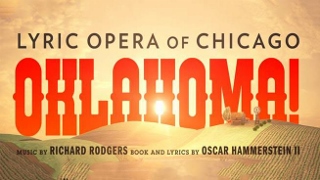
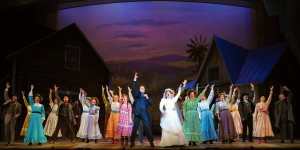
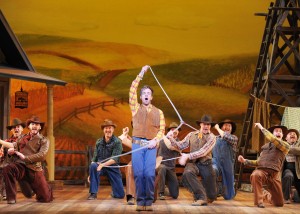
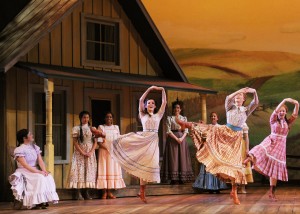
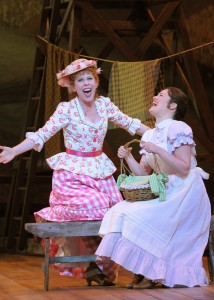

{ 1 comment… read it below or add one }
I’m so happy to find someone else who didn’t much care for the Lyric’s Oklahoma!. It was a tedious three hours and fifteen minutes unnecessarily prolonged by incessant dancing. At this afternoon’s performance, Judd hurt his knee in the first act and was out for the second. He’s an opera singer, not a dancer! My favorite part was the overture. Beautiful!